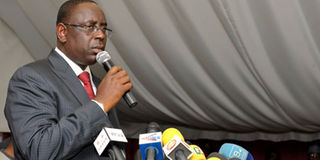Senegal’s new leader out to battle graft but his wealth questioned

AFP PHOTO / SEYLLOU
Newly elected Senegalese President Macky Sall delivers his victory speech in Dakar on March 25, 2012.
DAKAR, Sunday
Senegal’s president Macky Sall like his predecessor Abdoulaye Wade could have chosen not to declare his assets, but the new leader’s apparent quest to set the pace for a strict financial discipline to buttress the democratic dividend is inextinguishable.
By declaring his assets last week, the President seeks to obtain the legal credence he needed to set the country straight on the path to economic prosperity via the transparent management of the tourism and peanut-based economy.
Beyond that, his government intends to pursue some mischievous officials who turned millionaire during the periods of time they served under the regime of President Wade.
Most importantly also, the 51 year-old leader intends to break clean from the practice of impunity for rogue government officials that characterised President Wade’s regime.
The constitutional obligation on a Senegalese head of state to declare his or her assets exists since 2007 at the threshold of President Wade’s second mandate.
That period was characterised by a whirlwind of allegations, claims and counter claims of rampant corruption and financial malpractices among politicians with no credible referee including in the “kangaroo courts” to hold them accountable for their acts.
This situation spurred the civil society to step into the picture and helped to broker plans for the elaboration of a constitutional project that required the president of Senegal to declare assets upon taking office.
The essence of the law was to help the public and auditors to take note of the personal wealth of a president at the time of assuming office and at the moment of the president’s departure.
In Cote d’Ivoire a similar law requiring the head of state to declare his assets exists, but President Alassane Ouattara, one of Africa’s leading bankers has still to yield on his possessions.
In Senegal, President Macky Sall is apparently using the disposition as his Trojan horse in the fight against impunity, rampant corruption and to promote the spirit of accountability and set the precedence for future leaders to emulate.
Hence on Thursday May 10, 2012, President Sall proceeded with the signature of decree no. 2012-502 which guarantees the setting up of a court for the first time, to try graft suspects and particularly civil servants accused of illegally accumulating wealth.
The presidential decree named a popular magistrate Mandiougou Ndiaye and nine other judges to administer the court while justice minister Aminata Touré heads the instruction commission of the court.
But there is a strong wave of protest from the public not over President Sall’s insatiable quest to set up of a solid foundation for economic prosperity and financial discipline but over the authenticity of his declared private assets, all worth $2.6 million (KSh57m).
The question is not over the fact that he is one million euros richer than France’s incoming President François Holland, but over the fleet of 35 vehicles plus the scores of hectares of land he owns both in the chic Almady district of the Dakar and in the sprawling suburbs of Diamniado around the new airport.
Doubts persist in the public opinion even though the President’s men have tried to justify these assets by stating that they were acquired honestly.
For nearly a decade, the France-trained engineer worked with prestigious petroleum and gas companies before taking up his first government job as minister of energy in 2002 through 2008 serving as internal affairs minister, premier for four years and president of the national assembly.
“Senegalese are quick to cast suspicion on wealth owned abroad by their compatriots and that is the case with President Sall’s apartment in Texas,” El Hadj Hamidou Kassé explained.
Mr Kassé is the former Editor-In-Chief of the government daily ‘Le Soleil’ who is now a presidential spokesman.
Touching on the fleet of vehicles, President Sall had explained that most of them were acquired as gifts from his party supporters mostly emigrants working in the diamond and gold sector in central Africa where he had spent some time ahead of the presidential poll that he won against his former mentor.
“Don’t forget that I have a wife who is also a technocrat and makes my financial life easier, secured and certain,” President Sall told reporters in the aftermath of his declaration of assets.
The other question bogging President Sall is the appointment of Judge Mandiogou Ndiaye, his hometown relative who has had a murky past in his career. The presidential decree named Judge Ndiaye to head the court for the repression of illegal wealth.
During ex-president Wade’s regime, Judge Ndiaye was relieved of his post as president of the appeals court for turning a blind eye to a bail for a Senegalese con man who duped a Tunisian investor of 350 million francs (about $200,000)




